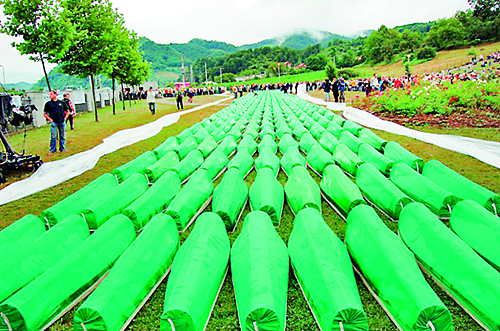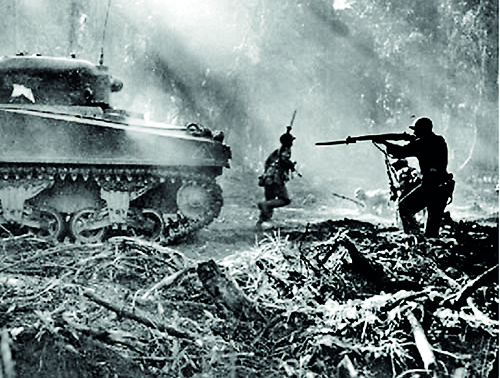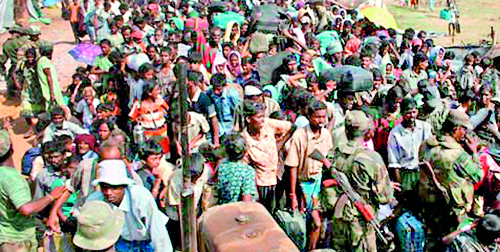Sunday Times 2
Genocide: A loaded word, anyone’s for use and manipulation
It was interesting to read in the Daily Mirror recently that Northern Province Chief Minister and former Supreme Court Justice C V. Wigneswaran has cautioned his council members about using the word genocide.
In the style of a cautious legal mind, he has highlighted that the word needs to be used in context and qualified whenever it is used, by

Ethnic cleansing in Bosnia
phrases such as, “…something similar to genocide…,” reported the Daily Mirror. Clearly, as a responsible justice, and one, no doubt well aware of the international human rights laws governing the use of the word, it is not surprising that Chief Minister Wigneswaran has opted for both professional honesty and political caution.
Hearteningly, Wigneswaran’s words also show that he will, wherever possible, resist political expediency, even where multi-million dollar campaigns of the diaspora have been built on, and the asylum claims of many Sri Lankan Tamil people overseas rest on a stance, in this case, the word, genocide.
It also speaks volumes of the multi-binds that Wigneswaran needs to negotiate through, given that one of the main thrusts of the Tamil diaspora’s campaign hinges on the use of the word genocide, in a purported effort to ensure justice and accountability of war crimes in Sri Lanka. These efforts mask the many different agendas that the diaspora, who invested money and time heavily in the LTTE have to take care of, which may not be entirely in the interest of, or the priorities of the Sri Lankan Tamil community that has chosen to live and build a future here.
Genocide in policy and public opinion
The word genocide is barely 70 years old. Yet, as Leo Kuper, sociologist, has said, “the word is new, the concept is ancient.” From as early as the time of King Agamemnon in mythical Greece to the Vendees in 18th century France, the Zulu massacres in 19th century Africa and anti-Jewish pogroms in 19th century Russia, there have been countless instances of one group of people attempting to eradicate “the other” peoples who had an identity distinct to theirs.
It is, however, Raphael Lemkin, a brilliant Polish Jewish jurist who had found asylum in Sweden during the Jewish holocaust, who first sought to frame the concept, as early as in 1933. Yet it is only later, during the 2nd World War that his attempt to frame the crime of destruction of persons collectively by nationality or ethnicity, rather than individually, took hold in the face of the atrocities of the holocaust, which Churchill described as “a crime without a name”.

World War II
Lemkin coined the word genocide and framed it to describe crimes against a collective of people for their unique identity, specifically based on ethnicity and nationality. With his positions as an academic at Yale and at Duke Universities in the US, and because of his relentless lobbying, Lemkin’s definition found fertile ground to entrench it in international law once the UN adopted it in its 1948 convention on the Prevention and Punishment of the Crime of Genocide.
Today, the concept of genocide is very much a part of everyday vocabulary and it has grown into a separate academic field which started in the early 1970s based on the work of scholars, and has culminated in associations such as the International Association of Genocide Scholars and in the establishments of departments of study in prestigious universities.
Interestingly, Samantha Power’s, the US Permanent Representative to the UN, book, The Problem from Hell: America and the Age of Genocide (2002), won the Pulitzer Prize and the National Book Circle Award in the US, and is said to have renewed the interest in the concept. The concept Lemkin framed has given rise to an academic and legal field, which, while essential for safeguarding vulnerable communities from the heinous crimes committed against them, is also open to manipulation.
Genocide is now one of the most emotionally loaded words in the English language. The emotional capacity of the word to influence policy and public opinion is not hard to imagine. It is an influence that the word needs in order to ensure that the most vulnerable of peoples who are subject to genocide are protected before it is too late. However, in political communication, words such as genocide have enormous power to become tools to further a specific agenda of a particular group.
In 1999 during the humanitarian crisis in Yugoslavia when President Slobodan Milosevic’s army engaged in what appeared to be ethnic cleansing of the Albanian people, the US Congress debated its policy on Kosovo. In this debate, which hinged on whether the US (through NATO) should intervene in the crisis, a trend emerged.
The debate focused on comparing what was going on in Kosovo through the terms and events of the past, in an attempt to define the role the US should play. The comparisons ranged from the Vietnam War to other historical events such as the lead up to WWII, the

World War II, the Yugoslav war and the Lankan conflict: Politicians picked the historical event that suited them best
Balkans role in the outbreak of WWI and the genocide of the Jews by the Nazis. Scholars such as Roland Paris would later call this the “metaphor war” because US policymakers needed examples from the past to guide their policy decisions in the Kosovo crisis.
In the US, therefore, political communication is controversial and much debated, as it is commonly acknowledged that there are “trigger phrases” that are emotionally loaded, which influence both policy makers and create public opinion. The phrases allow political communicators to manipulate and interpret events for their audience though the sheer emotional weight of the past event.
In the Kosovo debate in the US, depending on the response a particular lobby group wanted, they picked the historical event that suited them best. Those who wanted a rationale for US intervention picked the genocide metaphor. In both President Bill Clinton and Secretary of State Madeline Albright’s speeches, they reminded audiences of WWII. Those who didn’t support US intervention in Kosovo picked the Vietnam War as their historic event of comparison and questioned whether Kosovo could be compared to the Holocaust.
The reality back home is that the concept of genocide may have been used, if only as a threat or in the likeness, on the Tamil and Muslim communities by the Sinhala State (especially in 1983) as well as by the LTTE. The Sinhala community, on the other hand, remains in aggressive defence based on its historical memory of genocidal threats to it from centuries of South Indian invasions. The concept of genocide and the huge waves of emotion that it is capable of triggering off in different communities in Sri Lanka are as old and as complex as our history. In all this, the careless or devious use of the word, as Wigneswaran seems to have reminded his council as a lawyer and politician, will help no one’s cause.
Countering the story of genocide in Sri Lanka
Political analysts such as Roland Paris and Joesph Nye, and real world events, have shown that astute political communication and soft power involve a great deal of convincing storytelling, the right use of words and careful crafting of the setting of an event. Political communication used deviously includes highlighting details that are useful to the objective of the story and leaving out aspects that will reduce its power. This is a fact that comes out clearly in the narrative of genocide against the Tamil people in Sri Lanka. It is a story that has been cleverly crafted by the diaspora, and one on which several non-Sri Lankan journalists and activists have secured lucrative book deals and top media viewer ratings, and jobs for themselves.
However, the success and power of this carefully crafted story of genocide in Sri Lanka is not one to be taken lightly and brushed aside. It has, and will, influence the foreign policy of the international community towards Sri Lanka. Most crucially, the narrative is, as we all know, being used by the international community to justify an international inquiry into or intervention in Sri Lanka.
It is Sri Lanka’s weakness that we have not had the skill or the strategy in our foreign policy to expose the possible holes, bias or falsehoods in this story of genocide in Sri Lanka to the international community.
The use of aggression, loud ranting and hard power will do little to help. Neither will trying to take cover behind claims of national sovereignty be of any use in a day and age when the international community has developed tools, ideologically and institutionally, to subvert the concept of sovereignty, with concepts such as contingent sovereignty and the right to protect. Gagging, too, as anyone who has rushed out to buy a banned book knows, rarely stops a story. It only gives it more power.
Astute use of soft power is clearly needed if Sri Lanka is to overpower the genocide story based on real and substantial stories. A lesson in soft power in foreign relations may be timely. All the millions of US dollars spent on foreign PR companies will be a shameful and ludicrous waste of money, when all they can do is try to whitewash the country and brush aside an extremely powerful narrative without any substance from the ground.
There is only one way to counter the power of the genocide story, and the power of the word on its own, before it is used to further political agendas of particular groups and foreign and local policy goals of other countries. That is by establishing a local mechanism for catharsis and healing through recounting and re-telling, headed by a panel of eminent Sri Lankan nationals from all communities.
This process of healing through recounting needs to be a re-telling and documenting of events that took place in the lives of individuals from all communities, Tamil, Muslim and Sinhala, who were caught up for decades in the war zone and its borders. Only then, would multiple and competing narratives about the entirety of the 30-year war emerge that would be able to counter and add dimension to all that is being claimed in the genocide story. That is also the point from which any possibility of real national reconciliation will emerge.

